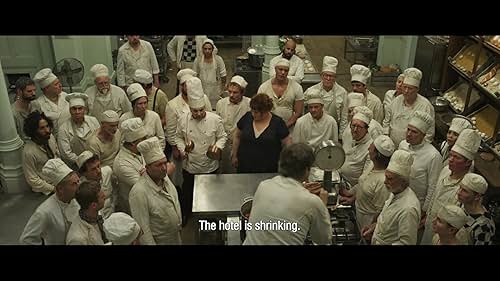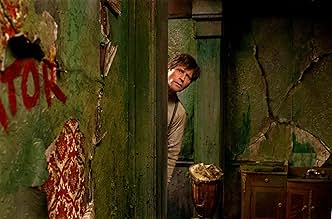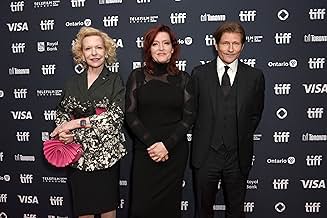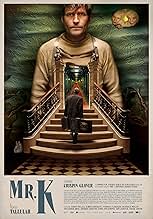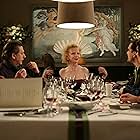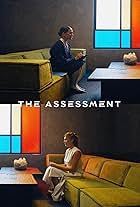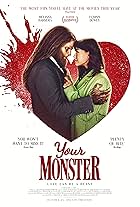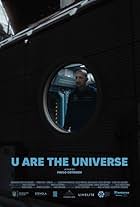After spending the night in a remote hotel, Mr. K is stuck in a claustrophobic nightmare when he discovers that he can't leave the building.After spending the night in a remote hotel, Mr. K is stuck in a claustrophobic nightmare when he discovers that he can't leave the building.After spending the night in a remote hotel, Mr. K is stuck in a claustrophobic nightmare when he discovers that he can't leave the building.
- Awards
- 2 nominations
- Director
- Writer
- All cast & crew
- Production, box office & more at IMDbPro
Storyline
Featured review
Saw this at the Imagine 2024 film festival in Amsterdam, where it was the main course at the formal opening. Very strange story, impossible to condense in a few sentences, other than what the synopsis on various websites already tried to tell us about this movie.
Kafka is referenced very often in the synopsis and reviews, and implicitly in the film title (Mr. K.) too. It is not bureaucracy being K's primary obstacle, but other people in the hotel, who are very happy the way it is now and don't want any change. The continuous drive K had to find the hotel exit, came initially from an early appointment he had the first day of his stay. Once he missed that, his urge to get out of the hotel persisted for no reason other than instinct.
A variety of mysterious circumstances and events hinder him on his way out, one of which is an often-appearing marching band passing through the hallways, without any goal or purpose, if only to confuse us as well as Mr. K. The walls and wallpaper start crackling, later revealing some vegetation, maybe suggesting that the hotel is in fact an organism with a purpose of its own. More such extraneous things pass by, none of those really eerie, merely unusual or unexpected, by lack of better words to describe what happened. K's whereabouts in the hotel's kitchen are even stranger, but what it means, if anything, can better be left to an unprepared viewer.
Quote: "We didn't need an exit before you came." From early on, we see the word Liberator painted on the wall near K's hotel room, obviously meaning something, but we don't know the author nor the reason why K is appointed that role. One moment he is respected, nearly worshipped as their liberator, and a few scenes later he is chased and attacked for destroying the hotel and ending everyone's peaceful existence. Neither is true, of course, but we don't know the real truth either. Maybe the best parody on normal life is demonstrated in the kitchen, with a peculiar hierarchy, and a head chef who sees some talent in K, only to feel challenged by him later.
The only objective evidence that unexplainable things are happening, and that the inhabitants cannot go on forever like they are used to, is the shrinking of the hotel rooms. We see the hotel guests cheerfully bringing their furniture to the corridor (which is also shrinking, but they do it anyway). Strangely enough, no inhabitant finds the shrinking building something to worry about. K's journey through the building lets us meet a variety of characters, all having their own role in defending the status quo as the way it should be, defying any changes.
Quote: "You look for the reception where you came into the hotel, to find the exit. Sometimes, the entrance is not the exit." (paraphrased). This comes from two wise-cracking elderly ladies, repeatedly offering him coffee and cake, seemingly in no way concerned about the world around them. They try to cheer up K, who is apparently in distress and deaf to their good-natured comments.
All in all, if you want a deeper showcase for the behavior of people living happily in their comfort zone, only to be disturbed in their happy isolation, this is an interesting and entertaining story. The "offender" causing the disturbance is ridiculed as well as worshipped. Instead of Kafka's struggle with bureaucracy, this Mr. K. must overcome the natural resistance of average people who clinch their quiet and peaceful existence, and who also refuse so see a lurking danger that is obvious to us but not to them. You need an outsider to trigger change, or better said a revolution.
Kafka is referenced very often in the synopsis and reviews, and implicitly in the film title (Mr. K.) too. It is not bureaucracy being K's primary obstacle, but other people in the hotel, who are very happy the way it is now and don't want any change. The continuous drive K had to find the hotel exit, came initially from an early appointment he had the first day of his stay. Once he missed that, his urge to get out of the hotel persisted for no reason other than instinct.
A variety of mysterious circumstances and events hinder him on his way out, one of which is an often-appearing marching band passing through the hallways, without any goal or purpose, if only to confuse us as well as Mr. K. The walls and wallpaper start crackling, later revealing some vegetation, maybe suggesting that the hotel is in fact an organism with a purpose of its own. More such extraneous things pass by, none of those really eerie, merely unusual or unexpected, by lack of better words to describe what happened. K's whereabouts in the hotel's kitchen are even stranger, but what it means, if anything, can better be left to an unprepared viewer.
Quote: "We didn't need an exit before you came." From early on, we see the word Liberator painted on the wall near K's hotel room, obviously meaning something, but we don't know the author nor the reason why K is appointed that role. One moment he is respected, nearly worshipped as their liberator, and a few scenes later he is chased and attacked for destroying the hotel and ending everyone's peaceful existence. Neither is true, of course, but we don't know the real truth either. Maybe the best parody on normal life is demonstrated in the kitchen, with a peculiar hierarchy, and a head chef who sees some talent in K, only to feel challenged by him later.
The only objective evidence that unexplainable things are happening, and that the inhabitants cannot go on forever like they are used to, is the shrinking of the hotel rooms. We see the hotel guests cheerfully bringing their furniture to the corridor (which is also shrinking, but they do it anyway). Strangely enough, no inhabitant finds the shrinking building something to worry about. K's journey through the building lets us meet a variety of characters, all having their own role in defending the status quo as the way it should be, defying any changes.
Quote: "You look for the reception where you came into the hotel, to find the exit. Sometimes, the entrance is not the exit." (paraphrased). This comes from two wise-cracking elderly ladies, repeatedly offering him coffee and cake, seemingly in no way concerned about the world around them. They try to cheer up K, who is apparently in distress and deaf to their good-natured comments.
All in all, if you want a deeper showcase for the behavior of people living happily in their comfort zone, only to be disturbed in their happy isolation, this is an interesting and entertaining story. The "offender" causing the disturbance is ridiculed as well as worshipped. Instead of Kafka's struggle with bureaucracy, this Mr. K. must overcome the natural resistance of average people who clinch their quiet and peaceful existence, and who also refuse so see a lurking danger that is obvious to us but not to them. You need an outsider to trigger change, or better said a revolution.
- How long will Mr. K be?Powered by Alexa
Details
- Runtime1 hour 34 minutes
- Color
Contribute to this page
Suggest an edit or add missing content


